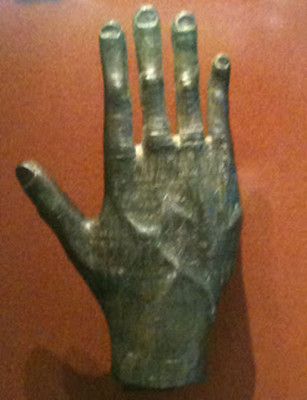Many monumental buildings survive, and along with them numerous inscriptions, which are evidence of a rich, sophisticated and in some measure literate society. Yemen at this point is no backwater; it dominates the entrance to the Red Sea, and with it the great trade route that linked Egypt and the rest of the Roman Empire to India. Writing in 79 AD, the Roman author Pliny the Elder explained why the Yemenis were so rich:
他們留下了無數的建筑以及銘文。而且有豐富的證據表明,在一定程度上這是復雜的社會文化。當時的也門絕非荒僻之地,它把守著紅海人口,控制了從埃及與羅馬帝國的其他地區通往印度的貿易路線。羅馬作家老普林尼在公元79年曾提及也門為何如此富裕:
"The chief productions of Arabia are frankincense and myrrh... they are the richest nations in the world, seeing that such vast wealth flows in upon them from both the Roman and the Parthian empires; for they sell the produce of the sea or of their forests, while they purchase nothing whatever in return."
阿拉伯的主要特產是乳香和沒藥…他們是世界上最富有的國度,從羅馬帝國與帕提亞帝國來的財富源源不斷地流入。他們出售來自海洋與境內森林的物產,卻從不購買任何別國的物品。
The "Incense Road" was in its way as important for the exchange of goods and ideas as the Silk Road. Frankincense was used by the Romans in absolutely vast quantities, and was the principal form of incense in the ancient world. The altar of every god in the Roman Empire, from Syria to Cirencester, burned with Yemeni incense.
“熏香之路”是一條曾與絲綢之路同樣重要的物品與思想交流通道。羅馬人大量使用乳香,它是古代世界最主要的香料。從敘利亞到賽倫塞斯特,羅馬帝國的每一個神壇上都燃著來自也門的熏香。
Myrrh had various uses: as an antiseptic for dressing wounds, for embalming-it was essential for Egyptian mummification - and in perfume. Although it's not a strong fragrance, it has the longest life of any scent known. Indeed it was myrrh that lay behind "all the perfumes of Arabia" which could not sweeten Lady Macbeth's bloodstained hand, although they would certainly have washed and sweetened Wahab Ta'lab's.
沒藥用途廣泛:包扎 傷口時可以殺菌,制作埃及木乃伊時用于涂抹尸體,還可以用于制作香水。雖然沒藥的香味并不濃烈,但它卻是已知的香料中后味最持久的。莎士比亞曾形容麥克白夫人“用盡所有的阿拉伯香水”都不能使她沾過血的手變香。這些阿拉伯香水中的主要成分便是沒藥。它一定清潔過瓦哈·塔拉布的手,并為他增添香氣。












